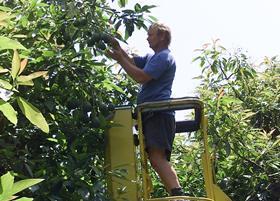
New Zealand’s horticulture industry is experiencing an influx of locals looking for employment.
Deemed an essential service by the country’s government, and therefore allowed to remain operational, many of the positions taken by locals would normally have been filled by foreigners on the Recognised Seasonal Employer (RSE) scheme.
But with the coronavirus having a widespread impact across the country, including border closures and industry shutdowns, many New Zealanders have been left without work and job security.
As a result, they have been turning to horticulture for employment, taking up the chance to work in the essential sector as harvest in the the apple and pear and kiwifruit sectors hit peak.
New Zealand’s agriculture minister, Damien O’Connor, said the NZ$6bn industry has long been one of the country’s export star performers, and is as important now as it has ever been.
“(The industry is) becoming a lifeline for a number of redeployed workers from industries such as tourism, forestry and hospitality,” said O’Connor.
New Zealand Kiwifruit Growers reported some businesses now have a workforce of up to 90 per cent New Zealanders, compared to the industry average of around 50 per cent last season.
Last week alone, more than 100 staff were placed into roles in the Bay of Plenty, Auckland and Nelson.
Meanwhile, the apple and pear industry has had 200 workers from other industries placed into jobs across the country.
“It is great to see Kiwis taking up the opportunity to be part of this essential industry. Now is a peak time for picking apples and kiwifruit. Workers are in high demand - over 20,000 are needed at the peak of harvest,” noted O’Connor.
“There are jobs going all over the country in our key growing areas and the government is working alongside the primary sector to help ensure workers get to the places they are needed.”
O’Connor added the government were currently investigating ways it could boost the primary sector essential workforce through its $100m redeployment scheme.
“There is no shortage of demand for our produce. The world needs a continuous supply of fresh fruit and vegetables and our country is in the position to help do that,” explained O’Connor.
“Our primary sector is part of the solution to global food security concerns in the short-term and will play a critical role in New Zealand’s economic recovery after Covid-19, which is why we have ensured that our food supply chain (farmers, processing, distribution, supermarkets) can continue to operate during the lockdown to keep our exports flowing,” he added.



